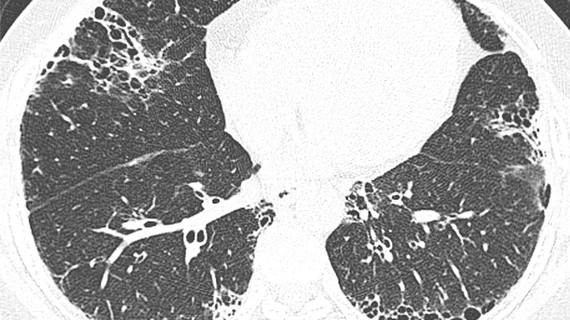Performance of RSNA's COVID-19 chest CT guidelines studied in vaccinated vs unvaccinated
True positive rates of COVID pneumonia on chest CT are significantly lower in patients who are vaccinated against the virus in comparison to their unvaccinated peers.
That’s according to a new analysis published in Radiology that compared the chest CT findings of hundreds of COVID-positive patients, both vaccinated and unvaccinated. Using RSNA consensus guidance, experts involved in the study reported that patients who were fully vaccinated against the respiratory virus displayed an overall true positive rate of COVID Typical CTs of just 41%. In comparison, their unvaccinated peers recorded a true positive rate of 73%.
The RSNA COVID-19 classification system has been in use since before rapid COVID tests and vaccinations were routinely available. It is still used widely among radiology institutions worldwide as a means of triaging patients when their COVID test results are in question. Researchers involved in this new study used the RSNA guidelines to determine whether vaccination status impacts true positive rates of CT in the diagnosis of COVID pneumonia.
For their study, the experts assessed a total of 652 chest CT scans, 483 of which were on unvaccinated patients and 169 on fully vaccinated individuals. The scans were obtained within seven days of the patients receiving a PCR-confirmed COVID diagnosis.
In addition to revealing higher true positive rates in the unvaccinated group of patients, the experts also found that these individuals were more susceptible to COVID pneumonia during peaks of the Alpha and Delta variants.
These results prompted the authors of the study to encourage the continued use of the RSNA consensus guidelines:
“The RSNA consensus guidelines, adopted by many institutions, have provided a standardized framework for interpreting and reporting CT findings associated with COVID-19 pneumonia,” co-senior author of the paper, Brent P. Little, with the Department of Radiology at Mayo Clinic Florida, and co-authors wrote. “This study showed that among an increasingly vaccinated population, these guidelines continue to provide valuable information for triage and disposition of patients being evaluated for suspected or confirmed COVID-19 infections.”
The study abstract can be viewed here.

